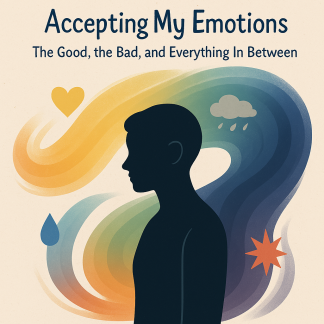Accepting My Emotions: The Good, the Bad, and Everything In Between
We all have emotions. They show up uninvited, stick around longer than we’d like, or vanish just when we need them. Some feel light and expansive — joy, love, excitement. Others can feel heavy or uncomfortable — anger, sadness, guilt. Then there are the tricky ones in between: numbness, confusion, or the feeling of “something just isn’t right.”
But what are emotions, really? And why do they matter so much to our mental health?
What Are Emotions?
Emotions are like internal messengers — signals from our body and mind that something important is happening. They arise in response to our environment, thoughts, memories, and even bodily sensations. At their core, emotions are designed to help us survive and thrive. They give us information, guide our decisions, connect us to others, and motivate us to act.
Emotions aren't just "in your head" — they’re a full-body experience. Think of how anxiety might bring a racing heart and shallow breath, or how grief can feel like a weight in your chest. Our nervous system, particularly the autonomic nervous system, is deeply involved in how we feel and process emotion. When we experience emotional distress over time without space for healthy expression or understanding, it can dysregulate our system — affecting sleep, appetite, concentration, relationships, and self-esteem.
Why Acceptance Matters
It’s common to label emotions as “good” or “bad.” But the truth is — all emotions serve a purpose. Even the ones that feel uncomfortable are trying to tell us something. When we reject or suppress certain emotions, they often become louder or show up in other ways: irritability, anxiety, physical pain, or even emotional numbness.
Acceptance doesn't mean resignation or passivity. It means allowing space for your emotions to be there without judgment. It’s the first step to understanding them, soothing them, and learning from them.
So… How Do I Accept My Emotions?
Here are some self-care strategies you can try this week to build emotional acceptance:
1. Name It to Tame It
Start by noticing and naming your emotions. Are you sad, anxious, content, embarrassed, hopeful? Labeling what you're feeling helps your brain regulate and creates distance from overwhelm.
2. Tune Into the Body
Where do you feel this emotion in your body? Is it a tightness, a flutter, a heaviness? Becoming aware of the physical sensation helps ground the experience and increases emotional literacy.
3. Drop the Judgement
Instead of thinking, “I shouldn’t feel this way,” try saying, “This is how I feel right now — and that’s okay.” Emotions aren’t problems to fix; they’re experiences to witness.
4. Practice the Pause
Before reacting impulsively to an intense emotion, pause. Take a few slow breaths. Remind yourself: “I don’t need to do anything just yet. I can sit with this.”
5. Write it Out
Journaling can be a powerful tool. Write freely about what you're feeling without editing yourself. This can help you gain clarity and feel less emotionally “clogged.”
6. Talk It Through
Sometimes, emotions need to be heard to be healed. Talk to a friend, a loved one, or a therapist. Sharing your inner world can reduce shame and increase connection.
Final Thought
Emotions are not the enemy. They are your inner compass — sometimes confusing, sometimes comforting, but always carrying a message. The more we accept them, the more at peace we become with ourselves.
If you find yourself overwhelmed or unsure how to navigate your emotions, therapy can be a powerful space to explore, understand, and process what you’re feeling. I offer a warm, non-judgmental environment where all of you — including your emotions — are welcome.
Let’s talk. You don’t have to figure it all out on your own.
Jon x

